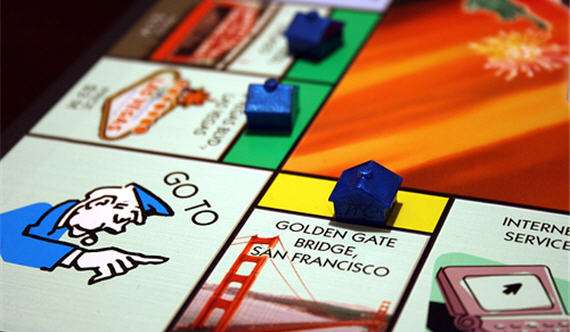Patently Absurd: America’s Bizarre Intellectual Property Laws
Microsoft is making millions from Android phones, despite having nothing to do with designing, marketing, manufacturing, or distributing them.
Microsoft is making millions from Android phones, despite having nothing to do with designing, marketing, manufacturing, or distributing them.
Timothy Lee explains “Microsoft’s Android Shakedown.”
Intuitively, this doesn’t make much sense. Most people would say that Google has been more innovative than Microsoft in recent years—especially in the mobile phone market—so why is Microsoft the one collecting royalties?
The reason is that Microsoft has more patents than Google. A lot more. The patent office has awarded Google about 700 patents in its 13-year lifetime. Microsoft has received 700 patents in the last four months. Microsoft’s total portfolio is around 18,000 patents, and most of those were granted within the last decade.
Impressive. But what has that to do with Android phones?
Getting software patents takes a lot of work, but it’s not primarily engineering effort. The complexity of software and low standards for patent eligibility mean that software engineers produce potentially patentable ideas all the time. But most engineers don’t think of these relatively trivial ideas as “inventions” worthy of a patent. What’s needed to get tens of thousands of patents is a re-education campaign to train engineers to write down every trivial idea that pops into their heads, and a large and disciplined legal bureaucracy to turn all those ideas into patent applications.
Creating such a bureaucracy has a high opportunity cost for small, rapidly growing companies. Most obviously, it requires spending scarce capital on patent lawyers. But it also means pulling engineers away from doing useful work to help lawyers translate their “inventions” into legal jargon. And that, in turn requires a shift in corporate culture. Startups are innovative precisely because they avoid getting bogged down in paperwork. Convincing engineers to pay more attention to patent applications necessarily means that they spend less time doing useful work, and that can be fatal to a young startup.
[…]
These differences are exacerbated by the long time lag between when applications are filed and patents are granted. Most of the 52 patents Microsoft received this week were filed between 2006 and 2008. One was filed as early as 2003. In 2006, Microsoft had been steadily cranking out patent applications for years, while Google was only just becoming large and profitable enough justify devoting serious resources to patent filings. So even if Google cranks up its patenting machine to Microsoft’s level this year, it won’t start seeing the fruits of that effort until around 2015.
That seems counterproductive but, again, what has that to do with Android phones?
You might think Google could deal with this by just not infringing Microsoft’s patents, but that’s not how software patents work. Android has roughly 10 million lines of code. Auditing 10 million lines of code for compliance with 18,000 patents is an impossible task—especially because the meaning of a patent’s claims are often not clear until after they have been litigated. Most Silicon Valley companies don’t even try to avoid infringing patents. They just ignore them and hope they’ll be able to afford good lawyers when the inevitable lawsuits arrive.
So Android, like every large software product on the planet, infringes numerous Microsoft patents. And Microsoft is taking full advantage. They’re visiting Android licensees and giving the same sales pitch Reback remembers from a quarter century ago. “Do you really want us to go back to Redmond and find patents you infringe? Or do you want to make this easy and just pay us?” Once again, many of the targets are writing checks to make the problem go away.
That’s what this has to do with Android phones.
It’s hard to blame Microsoft for this. Indeed, it likely ran afoul of exactly this sort of issue when it was a fledgling company. But this system is madness. It simply shouldn’t be possible to gain exclusive rights to an obvious engineering process, much less one that you’re not going to put into production.
The purpose of patents is to encourage innovation by protecting inventors from having their products reverse engineered and thus having to compete with their own inventions. I fully support that notion. But it’s absurd to allow companies to file patents for the sole purpose of demanding reparations once someone else figures out–independently of the patent holder–how to do something useful with a concept.







Algorithmic patents (including software and business process patents) should be disallowed. They allow entire classes of solutions to be owned, less on the strength of the original invention, and more on the claim of generality.
I’m sure those MS patents aren’t “in” Android, they are just “similar.”
No James, it is not, it is in fact very easy to blame them for this as it is purely a shakedown. This is the school bully saying, “Give me your lunch money or I’ll punch you in the face.”
Just because something is legal, doesn’t make it right.
Part of the problem is that, when the whole idea of software patents came about, the PTO and the Courts were applying and old law to a new thing. It’s led to the mess we have now, but nobody has the incentive to change it because the big companies all profit off it. It isn’t just Microsoft, IBM is one of the biggest patent holders out there, and Sun and Apple aren’t far behind.
Another problem is that it will be very difficult to deal with patent trolls without an overall reform of intellectual property laws and that gets you into the realm of entertainment, where the problem isn’t excessive patents but people who feel they’re entitled to the product of other people’s labor without compensating them for it.
Mike
@JP:
As the embarrassed “inventor” of one of these (the corporation holds the actual patent) I totally agree.
However, I expect the rate is only going to increase as more money is going to be made on the patenting of algorythms than in hardware — especially in the area of consumer electronics, where the low manufacturing margins has led to a push to using cheaper and less proprietary technologies (on the plus side this also makes the hardware easier to hack).
That would actually be relatively easy, if Microsoft would actually state which of their patents are being violated. So far they refuse to even do that. It’s very much a “Pay up or we’ll find something to sue you for, and it’ll cost you more in legal fees that we’re demanding in royalties”. They’re also suing people who don’t actually own the patents, they’re suing Motorola and Samsung over Android.
Not so much, the software patent minefield was very different when Microsoft was starting out, and they were able to “borrow” liberally from many different companies, including Apple and Xerox, without having to face these kinds of lawsuits.
The complexity of software and low standards for patent eligibility …
You can stop right there. Calling them “low” standards is really quite generous.
Personna is absolutely correct that the main problem is trying to imply this old idea to pretty simple algorithms (brain-dead simple to most programmers). But an additional problem is that the USPTO is basically a for-profit institution. They have a motto that declares the #1 goal is to approve as many patents as fast as possible.
So you’ve got big corporations and the USPTO on the wrong, but winning side. It’s going to take somebody with some balls to change this.
This is an interesting addition I think: http://www.cringely.com/2011/07/the-enemy-of-my-enemy/
This limits innovation and development.
Actually, Microsoft did not have to deal with this kind of thing when it was young. Microsoft in no small measure started this kind of thing. In the mid-80s there was a famous exchange from Gates with various people in the microcomputer software community. At the time the norm was that we all wrote and exchanged software with each other for free a lot. It was just the way the community grew from its mostly techno-hippie roots. Also there wasn’t a lot of choice. You couldn’t write all that yourself from ground up. Gates argued then (shockingly at the time) than all software should cost money and mostly no one should even see it.
Also if I remember correctly software only became patentable in the 80s. So it is certain Microsoft had little/no software patents relative to today.